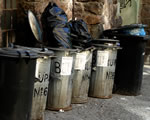 Go to main content
Go to main content
Archive Website of the UK government
Please note that this website has a UK government accesskeys system.
Main menu
Page menu
Home and community

Fly-tipping - what you can do

Dumping waste where it's not allowed, or allowing others to do so, is a criminal offence. You could face very large fines and even be sent to prison. Find out how to avoid fly-tipping and how to report it to your council or the Environment Agency.
What is fly-tipping?
Report fly-tipping to your local council
Fly-tipping is the illegal dumping of waste on land that doesn’t have a licence to receive it.
Fly-tipping can be dangerous, pollute land and waterways and costs the taxpayer significant amounts of money to clear away.
Some people make money by charging to take waste away illegally and then fly-tipping it.
Who is responsible for clearing up fly-tipped waste?
Local authorities and the Environment Agency are responsible for clearing up / investigating fly-tipping on public land. Clearing fly-tipping from private land is the responsibility of the landowner.
Penalties for fly-tipping
Dumping waste illegally is a serious criminal offence that carries a fine of up to £50,000 (unlimited if the case goes to the Crown Court). You could also face a prison sentence of up to five years for fly-tipping. Local councils treat fly-tipping very seriously and will usually prosecute anyone caught.
You could also face the same penalties if:
-
you allow someone to fly-tip on your land
-
a vehicle registered to you is used to fly-tip
You could face penalties of up to £5,000 if you don’t check that the company or person you give waste to:
-
has a licence to carry waste
-
is not taking it to an unlicensed site
To find out how to check the company or person taking your waste, see the ‘How to make sure you don’t fly-tip’ section.
If you find fly-tipped waste
If you discover fly-tipped waste, there are some do's and don'ts:
Don't:
- don't touch the waste - it may contain syringes, toxic chemicals or other hazardous substances
- don't disturb the site - there may be evidence that could help identify the fly-tippers and lead to their prosecution
Do:
- visually try to work out what the waste consists of and how much there is
- make a note of the day, date and time you saw the tipping, its exact location and whether it’s in or near water
If you see someone fly-tipping, make a note of:
- how many people are involved and what they look like
- what has been tipped - how much and what it looks like
- details of any vehicles involved including make, colour and registration number if possible
Be very careful. Remember that fly-tippers are doing something illegal – they are unlikely to welcome people observing them or taking notes or photographs.
Report fly-tipping
You should contact your local council to report fly-tipping. Provide as much detail as possible. The link below will take you to your local council website where you can find out more.
Alternatively, you can contact the Environment Agency on 0800 80 70 60. The Environment Agency deals with fly-tipping incidents if they involve:
- very large amounts of waste
- organised or criminal fly-tipping operations
- hazardous waste
How to make sure you don’t fly-tip
You must pass your waste on to your local authority or a waste carrier registered with the Environment Agency. If you don’t take reasonable steps to do this, you could be prosecuted.
Take your waste to a licensed waste disposal site
Your council will run one free of charge for residents to dispose of household waste. Your council will be able to tell you locations and opening times. Use the link ‘Find your nearest recycling centre’ to go to your council website and find out more.
Use a registered waste carrier
Anyone who takes away your waste must be a registered waste carrier. This includes scrap metal merchants, house clearers and rag and bone men.
There are some businesses carrying their own waste that don’t need to register until the end of 2013. See ‘Waste carriers: who needs to register?’ for more information.
You can check if a company is licensed to carry waste by:
- asking to see a waste carrier’s certificate
- asking for a waste carrier number – call the Environment Agency on 03708 506506 to get a Waste Carrier Validation Check
- searching for the company on the Environment Agency’s public register – you can also use this to find a licensed waste carrier near you
You can check whether the site your waste is being taken to is licensed by searching the NetRegs waste directory.
Recycling and disposing of your waste
Most household waste can be recycled. See ‘Waste and recycling: a quick guide’ to find out how you can reduce the amount of waste you create.
To find out more about disposing of waste, see ‘Bins and waste collection’. This tells you how to safely get rid of:
- electrical equipment
- hazardous waste
- clinical waste
It also explains the rules around using skips.
 Facebook
Facebook Twitter
Twitter StumbleUpon
StumbleUpon Delicious
Delicious Reddit
Reddit